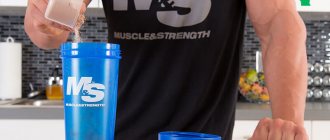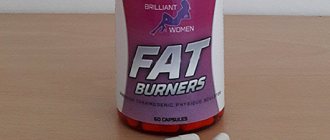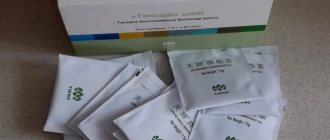Types of sports nutrition
Let's start by finding out what sports nutrition is. In fact, this is not food, but just a dietary supplement to food. Obviously, there is no point in taking dietary supplements in cases where the diet includes all the elements necessary for the body in sufficient quantities. However, people actively involved in sports have an increased need for many of these substances. This is especially true for proteins. Sports nutrition is designed to satisfy this need.
Depending on what substances are supplied to the body by tablet, powder or cocktail, sports nutrition can be divided into several categories:
- protein shakes (provide the protein necessary for muscle growth);
- amino acids (play essentially the same role as protein);
- gainers (protein-carbohydrate cocktails), which perform two tasks: muscle growth and restoration of strength spent during training;
- energy drinks (increase the body’s endurance);
- vitamin and mineral complexes;
- fat burners;
- special drugs (often hormonal) that have a narrowly targeted effect.
Some believe that sports nutrition also includes anabolics - synthetic drugs that replace testosterone - a male hormone that stimulates a number of processes in the body, including the growth of muscle mass. In fact, anabolic steroids are classified as doping drugs; their use in sports is prohibited, so they cannot be considered sports nutrition.
What is in sports nutrition?
So, the body requires proteins and their constituent amino acids, carbohydrates, vitamins, and other substances. To build muscle, protein requires much more than usual, as well as other substances. And there are two options: eat more... or buy sports nutrition.
Of course, not just any way. There are several groups:
- Protein. That is, protein shakes. There are whey, soy, egg, hydrolyzed meat or fish protein, casein, and milk isolate. The highest quality and most effective are hydrolysates and egg protein. Whey is the fastest in terms of digestibility, it should be consumed immediately before training. Casein, on the contrary, is the “slowest” and is taken at night. But in any case, all types of such sports nutrition are of natural origin, since protein is extracted from food.
- Amino acid complexes. First of all, they are used to repair damaged muscle fibers. Unlike proteins, where the amino acid composition is not the most balanced in terms of specific needs, amino acid complexes are more intelligently composed. These include, for example, BCAA. It is a combination of three essential amino acids – leucine, isoleucine and valine. Without BCAA, muscles “starve” and, accordingly, cannot grow, and the loss of other amino acids increases. BCAA is the basis of sports nutrition for bodybuilding, powerlifting or other sports where growth and muscle strength are important.
- Gainers. This is the name given to a type of sports nutrition that combines protein and carbohydrates. Energy and building material are what provide mass gain. This type is a must for all athletes. Often the gainer contains vitamins, amino acids and other components that increase its effectiveness. Gainers are best suited for those who have a lean build and do not tend to accumulate fat. This makes it more difficult to gain muscle mass, and a mixture of protein and carbohydrates helps solve the problem.
These are three main groups that can be attributed specifically to sports nutrition. Other types, such as creatine, fat-burning substances, vitamins and individual amino acids, rather belong to nutritional supplements, each of which has a strictly defined role.
What are sports dietary supplements made from?
Manufacturers of sports dietary supplements claim that they are based on natural food products of plant or animal origin (meat, egg or soy protein, caffeine obtained from tea or coffee, other substances). Based on this, they conclude that sports nutrition is no more harmful than regular food, and the only contraindication to its use may be individual intolerance, expressed by indigestion or food allergies.
It is not easy to check their words, since there are no GOST standards for sports nutrition, and, in fact, no one controls its quality.
In America, where some independent organizations are involved in testing sporpitis, these products often contained synthetic substances not specified by the manufacturers that could cause considerable harm to the body.
What should the buyer do? If the decision to use sports dietary supplements has been made, preference should be given to products from well-known manufacturers that have proven themselves well. In this case, the risk of eating something wrong is significantly reduced.
Benefits, harms, contraindications and side effects
Sports dietary supplements have different effects on the body. Each of them, solving the tasks for which they are hired, brings certain benefits. Sports dietary supplements help you lose weight, make muscles more prominent, restore strength, increase the body's endurance, and build muscles.
It must be said that you shouldn’t expect miracles from sports nutrition: if you don’t go to the gym, you won’t achieve success, no matter how many liters of protein shake you drink. On the other hand, you can build muscle without using dietary supplements; you just need to build your diet correctly.
However, each product also has its own specific contraindications.
- Thus, energy drinks are contraindicated for those who have problems with the cardiovascular system. They are capable of creating these problems themselves if they are used uncontrollably. They should not be taken by hypertensive patients or people with a weak heart.
- Protein intake puts increased stress on the liver and kidneys. If you already have kidney or liver failure, taking protein shakes will only make the problem worse.
- Amino acids are contraindicated for people with diseases of the gastrointestinal tract.
- Gainers should not be taken by people with metabolic disorders or diseases of the endocrine system. They are especially dangerous for patients with diabetes.
- Particularly dangerous are anabolic steroids and synthetic additives, the inclusion of which in products is usually kept silent by the manufacturer. We are talking about steroids and similar substances. They significantly increase the risk of cancer, especially in men, and have a negative effect on potency. It is with them that the widespread popular opinion about the extremely high harm of sports nutrition is associated.
In any case, it makes sense to inform your doctor about your intention to start taking sports nutrition. If he tries to dissuade you, it makes sense to listen to his opinion.
In addition, even without contraindications, sports nutrition can cause a negative reaction in the body:
- allergies;
- nausea;
- diarrhea;
- flatulence;
- constipation;
- heartburn.
This is due to the fact that the body is not used to receiving the substances it needs in its pure form, so sports nutrition is absorbed differently than regular food.
Unpleasant side effects can also occur if you take dietary supplements in violation of the manufacturer’s recommendations. Taking low-quality products and expired medications will also not lead to anything good.
The root causes for the emergence of the “harmful sports nutrition” market
Next, we will introduce you to some facts about the general state of affairs in the sports nutrition market, largely due to which the market for harmful sports nutrition arose.
The sports nutrition market is not controlled by the state
In the United States, and throughout the world, sports nutrition is marketed without prior consumer health safety research .
This is facilitated by the fact that no one is preventing it: sports nutrition products have somehow surprisingly found themselves on the margins of control by government agencies, despite their status being slightly different from medications.
A thorough study is carried out only if there are numerous facts of harm and side effects of a particular product and this is carried out by the FDA (Food and Drug Administration).
The quality and absence of harm to health of sports nutrition is not controlled by any government agency in the United States and, most likely, in any country in the world
Moreover, even the fact that scientists and doctors have recorded many cases of colossal harm of various types of sports nutrition for the health of athletes (and even deaths) does not prevent us from holding our heads and reconsidering our attitude towards this class of goods.
Numerous studies of popular supplements for weight loss and muscle growth that promise quick results indicate that they often contain prohibited substances that pose a risk not only to the health, but also to the reputation of professional athletes, increasing the likelihood of a positive doping test when you don’t expect it. .
Thorough scientific research in independent laboratories often reveals the content of prohibited drugs in sports nutrition products or discrepancies in composition even in the most “innocent” products
We recommend : Fat burner harms and side effects: what makes natural supplements dangerous?
Demand creates supply
In professional sports, resisting the temptation to “help your body,” as one of the famous Russian bodybuilders said, referring to the latest achievements in sports pharmacology, is very difficult, given the considerable prize funds.
Manufacturers of specialized sports nutrition know that athletes are very vulnerable to this. The effectiveness of many drugs is indeed confirmed by scientific research, but others are not.
As for amateurs, as we have already noted, today many young boys and girls are looking for quick ways to solve their problems with appearance, with excess fat or lack of muscle mass.
For them, it is quite enough to do only “external tuning”, and by any means, preferably without extra effort and quickly. This desire makes them very open to everything that is forbidden.
We recommend : Vitamins for athletes: pros and cons
High level of trust in principles from the past
Surprisingly, modern athletes have a very high level of trust in ideas from the past in the field of sports nutrition, which have been reliably proven wrong today.
The most significant example: it has long been proven that there is no relationship between a diet with an ultra-high protein content and sports performance .
However, professional athletes, and even more so amateurs and their coaches, continue to persistently follow this myth, daily consuming huge doses of proteins, as well as amino acids (already contained in proteins!), guided by the principle “the more the better”, not realizing that most of the undigested protein is simply flushed down the toilet.
We recommend : Which is better protein or amino acids (+ bcaa)? Reviews from doctors and experts
Athletes, both amateur and professional, are characterized by a very high level of trust in ideas from the past, the uselessness of which is scientifically proven today
Science and pseudoscience
The sports nutrition industry is growing rapidly. More and more scientists are getting involved in the research process: for some of them, large companies order they need in order to put the “scientifically proven” stamp on their products; others, who are not yet alien to the principles of honesty and objectivity, strive to find out the truth in order to promptly warn users about potential harm or tell them how to properly take a particular product in order to save them from wasting money.
There is a kind of struggle going on between both.
Scientists cannot always be trusted: many of them are fed by sports nutrition manufacturers
Some of the most common supplements in professional sports nutrition are protein, creatine, amino acids, energy drinks, fat burners, L-carnitine, nitric oxide supplements (arginine-based products), etc.
While the benefits and effectiveness of protein and creatine have been clearly proven, L-carnitine, arginine and many fat burners, amino acids and even some types of protein (for example, soy) raise many questions from scientists.
The effectiveness of arginine, carnitine for weight loss, and the benefits of taking amino acids separately along with protein have not been clearly proven.
Energy drinks do provide a short-term energy boost due to the carbohydrates and caffeine they contain, but at the same time, their detrimental effects on the heart, metabolism and central nervous system have been clearly proven.
The truth is that the colossal amounts of money left by athletes at sports nutrition stores make someone richer. And that explains everything.
You can rest assured that when someone needs to sell you something, even the most harmful sports nutrition product can be presented as incredible and delicious.
For example, look at our material on whey and soy proteins, in which we analyze an article from the popular English-language portal bodybuilding.com, the purpose of which is to stimulate sales of soy protein. To prove the benefits, the opinions of false scientists are also used there.
We recommend : 13 scientific facts about the dangers of energy drinks
Doctors' opinion on the dangers of sports nutrition
Medical opinions about the benefits and harms of sports nutrition are divided. Scientists, “fed” by sellers and manufacturers of sports nutrition, confirm their statements about the safety and even usefulness of sports dietary supplements, about the naturalness of their composition.
Attending physicians who have nothing to do with this business often become opponents of sports nutrition. It is understandable that they are afraid of facing the possible negative consequences of their patients using active food additives. It is possible that many of them simply want to play it safe and insure their patient.
It is difficult to find independent experts, but if the opinion of doctors regarding the harm of sports nutrition is important to you, we will present the results of a survey conducted by one of the Internet portals.
- According to its results, every second nutritionist said that sports nutrition is intended specifically for professional athletes, but ordinary people should not include it in their diet.
- Every third doctor considered that sports dietary supplements do not pose a great danger, and everyone can take them, provided that they have no contraindications to this.
- Other doctors advise giving up sports nutrition so as not to harm your health, and this advice applies even to those who play sports professionally.
It’s up to you to decide how justified your use of sports nutrition is. If you do decide to try to include them in your diet, try to reduce the risk of negative consequences.
Facts about the harm of sports nutrition from an independent scientific laboratory
Below, as an illustration, are some facts from the independent laboratory ConsumerLab.com about the dangers of sports nutrition.
1 Hidden substances in sports nutrition
According to scientific research, it is the prohibited hidden ingredients (steroids, hormones, amphetamines) that most often cause harm to health when consuming sports nutrition.
A common practice is to add anabolic steroids, either explicitly or implicitly, to bodybuilding supplements.
This is done to ensure a quick “Wow!” effect in building muscle mass and losing weight.
Examples of the most popular synthetic steroids are methasterone and dimethazine .
What are the dangers of hidden ingredients?
Taking such supplements may, among other things, increase the risk of testicular cancer in men and cause liver damage .
Compared to men who had never used these supplements, the risk of developing testicular cancer was found to be 65% higher among those who had ever used them; 121% higher when used before age 25; by 156% - when used for more than 36 months; by 177% - when using two or more additives containing prohibited substances 1.
Another common outcome is liver dysfunction.
One scientific report notes the diagnosis of serious liver damage and hepatitis in 44 young athletes 4. As the reason, the researchers named anabolic steroids, which were contained in hidden form in sports supplements taken by athletes, i.e. were not clearly stated on the packaging.
At the same time, scientists note that the presence of hidden ingredients in sports nutrition for bodybuilding is common .
The main cause of harm in sports nutrition is most often prohibited hidden ingredients: steroids, stimulants, hormones. Their consumption significantly increases the risk of developing testicular cancer in men
Neither drug has been studied for harm during pregnancy or breastfeeding; Therefore, it is strictly not recommended to take them at this time.
We recommend : Sports pharmacology: consequences of use and side effects
2 “Natural” does not always mean “harmless”
Manufacturers of sports nutrition containing prohibited substances sometimes mislead by claiming that they are natural and derived from plants .
For example, the following ingredients are often added hidden to some sports nutrition products to enhance the effect (in particular, fat burners):
Read us on the networks
- aegeline stimulant : the manufacturer claims that it is made from Bengal Quince;
- DMAA (dimethylamylamine, 1.3 dimethylamylamine or methylhexanamine): the manufacturer states that it is made from Geranium;
- DMBA (1,3-dimethylbutylamine, 2-amino-4-methylpentane or 4-methyl-2-pentanamine and also labeled 4-amino-2-methylpentane citrate, AMP citrate, 1.3-dimethylbutylamine citrate, 4-amino-2- pentanamine, Pentergy, and 4-AMP): manufacturer states that it is made from Pouchung Tea;
- N-diethyl-phenylethylamine : the manufacturer states that it is made from the Dendrobium Orchid;
- BMPEA or beta-methylphenethylamine: The manufacturer states that it is made from Acacia rigidula.
Animal studies of the harms of these substances indicate that taking BMPEA may increase blood pressure and be accompanied by similar side effects to other amphetamine-like substances, the safety of which has not been studied in humans.
BMPEA was first registered by the US Food and Drug Administration in 2013 in weight loss, energy and mood supplements. Study 2 suggests that BMPEA is still on the market and is actively used by manufacturers, primarily in products containing Acacia rigidula.
In 2014, ConsumerLab.com researchers tested sports supplements available for purchase in online stores during the January-April 2014 time period that were labeled as containing Acacia rigidula. All of them were intended for weight loss, increasing athletic performance and mental activity. 11 of the 21 supplements—many from the same manufacturer—contained BMPEA in varying doses (ranging from 3 to 94 mg)2.
Supplements containing BMPEA included Aro Black Series Burn
(Vitacost),
Lipodrene Hardcore
(Hi-Tech Pharmaceuticals) and 9 others, including 2
Jet Fuel Superburn
(GAT) sports supplements.
Some of the products on this list, sold by Hi-Tech Pharmaceuticals, have been seized in the past for containing the illegal substance DMAA. Back then, DMAA and its analogue DMBA were also disguised on labels as plant extracts.
Laboratory studies have found that many weight loss and sports supplements contain the banned stimulant BMPEA.
We recommend : Anabolic steroids: consequences of use and side effects | Scientific facts
ConsumerLab experts recommend avoiding any sports nutrition product that contains any of the following prohibited ingredients , and opting for single-ingredient products rather than multi-ingredient products or those containing proprietary blends with unknown composition or that produce incredible muscle-building or weight-loss benefits.
| List of prohibited ingredients that pose a health hazard: |
| aegeline |
| DMAA (dimethylamylamine) |
| DMBA (dimethylbutylamine) |
| N-diethyl-phenylethylamine |
| BMPEA (beta-methylphenethylamine) |
| methasterone |
| dimethazine |
We recommend : Diuretics: side effects of use in bodybuilding
How to reduce side effects and possible harm
As already mentioned, it is not recommended to buy cheap dietary supplements of dubious production. However, even if you use expensive sports nutrition, you are not immune from unwanted consequences. To reduce the risk of occurrence, adhere to the following rules:
- do not take dietary supplements in large quantities exceeding the natural needs of the body (1.5-2 g of protein for men, 1.2-1.5 g of protein for women per 1 kg of body weight excluding body fat);
- divide the daily dose of sporpit into portions, distributing them throughout the day;
- time the use of sports nutrition with your regular meals;
- Wash down foods containing a lot of fiber (for example, apples) with protein shakes;
- do not take several types of dietary supplements at once, especially those acting identically or, on the contrary, in the opposite way;
- The duration of a sports nutrition course should not be more than three months, the break between courses should not be less than their duration.
I can give you one more piece of advice: don’t buy a lot of a product that’s new to you at once. Take a sample of a small package to check how your body reacts to the new product and how acceptable its taste is to you.
Share
- 2











